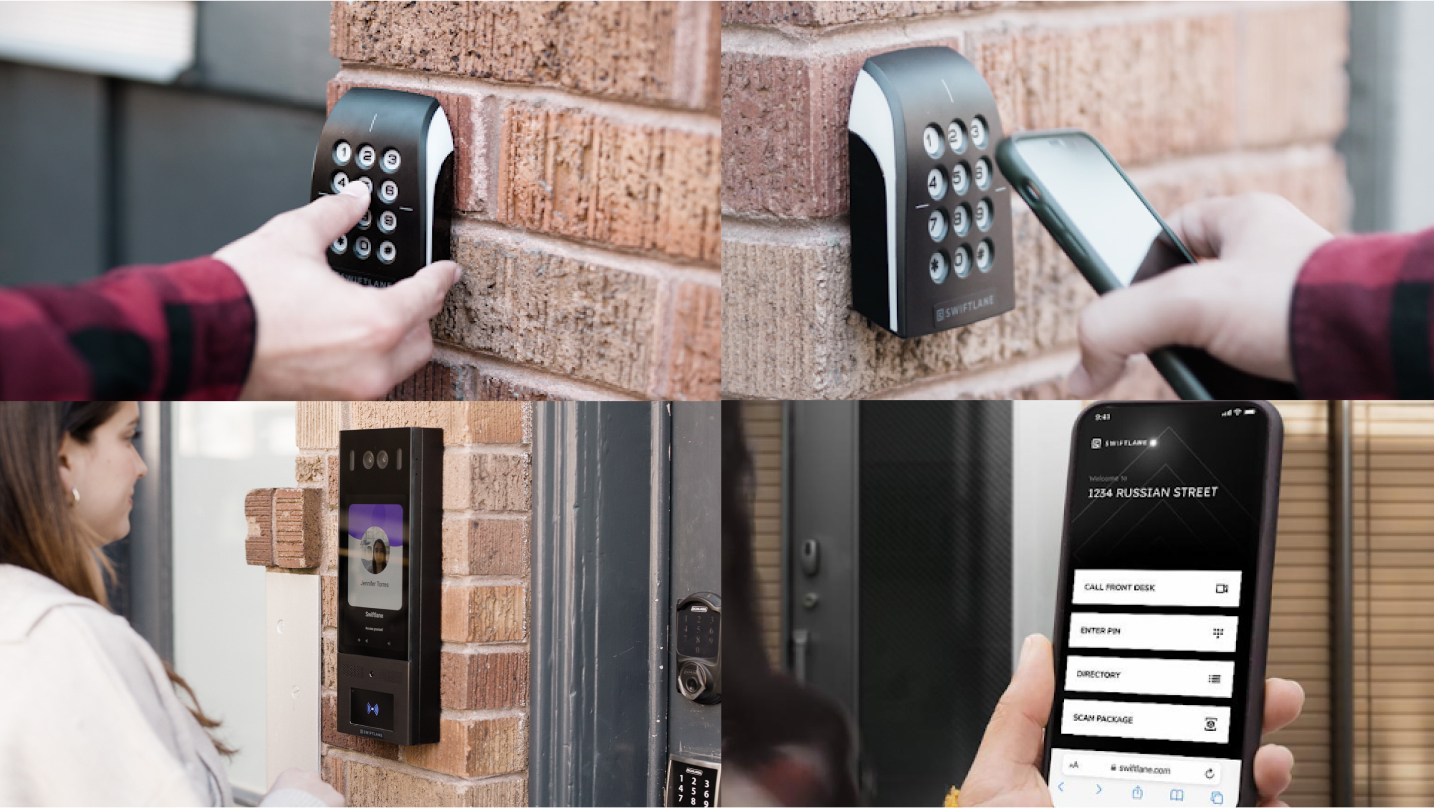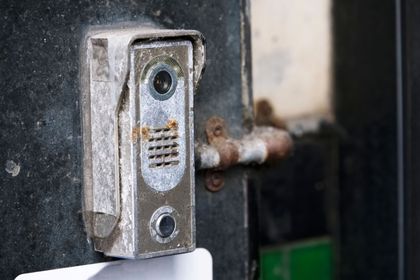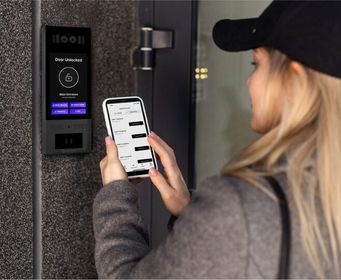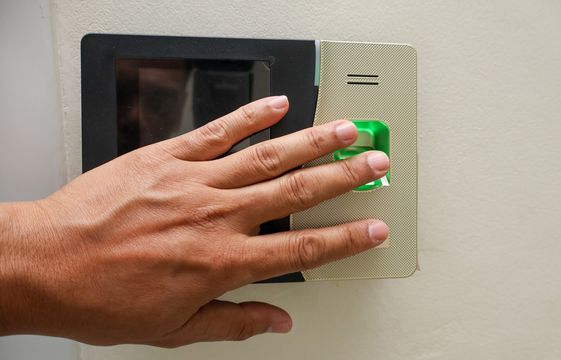As a professional in the real estate industry, you need to be highly selective when choosing a security system. You’ve got tenants to consider, budgets to stick to, and a hundred devices to choose from. That’s why we’ve created this rundown for you; so you can choose the best apartment security system for your building this year, without being stuck with subpar security.
After surveying multiple systems, we’ve concluded that the best security system for an apartment isn’t necessarily the most expensive one — it’s the one that works with your unique specifications and requirements.
If you want a system that’s affordable or easy to install, or one that doesn’t lock you into long-term contracts, this article will walk you through top-rated systems that offer the security you need without the hassle.
Key Takeaways
- There is no one-size-fits-all solution for apartment security. Selecting the best apartment security system for your property requires you to assess user and management demands and the capacity of the current system so that you can find an optimal solution within your budget.
- Apartment security hinges on three pillars: Alarms, cameras, and overall access control systems.
- Top-rated security systems for 2025 include SimpliSafe and Ring for alarms, Eufy and Ubiquity for cameras, and Swiftlane and Doorking as the best overall access control system.
Table of Contents
- The Three Pillars of Apartment Security
- Top Security Alarm Systems for Apartments
- Best Security Camera Systems
- Highly-Rated Access Control Systems
- Checklist for 2025: Choosing the Best Apartment Security System
- The Bottom Line
- Frequently Asked Questions
Suggested Posts
- Key Fob Entry Systems for Commercial Buildings – Buyer’s Guide 2024
- Building Intercom System: Buyer’s Guide
- Best Facial Recognition Access Control Systems to Buy in 2025
- Yale Smart Locks for Unit Doors – Offered by Swiftlane
- The Best Apartment Intercom Systems (2025)
The Three Pillars of Apartment Security
If you think an apartment security system is a one-device affair, that’s not quite right. An ideal security system is made of several components functioning in tandem with each other to provide optimal safety. Each component serves a unique purpose, and a weakness in any area can leave your property vulnerable. Here’s a quick breakdown of major apartment security systems:
Security Alarms
These are the first lines of defense against intruders and help detect break-in attempts and alerts for unauthorized access.
Security Cameras
Cameras help you monitor your property remotely while also providing evidence of any suspicious activity or security breach.
Access Control
These are probably the most vital components that help authorized users gain seamless entry and deter any unwanted entry. Advanced access control systems allow remote management and customization of access levels, log all access events, and help you video-verify visitors in real-time. This layer can include intercoms, credential readers, and smart locks, as discussed in the next sections.
Choosing the right security system can be overwhelming, given the myriad of options available. To aid in your decision-making, we’ve curated a list of the five best apartment security systems of 2025. We looked at usability, features, and high customer satisfaction among other high-ranking metrics. The below options offer a combination of DIY and professional installation options, ensuring that every renter can find a system that suits their needs and budget.
Let’s explore what the best options in each of these segments have to offer down below.
Please note: All recommendations are based on in-depth product comparisons, customer feedback, and reviews from trusted forums. Please use discretion in choosing a system for your needs and use this guide in addition to your own personal research.
Top Security Alarm Systems for Apartments
SimpliSafe
One of the biggest factors in choosing an ideal alarm system is its simplicity of installation. SimpliSafe is known for exactly that. SimpliSafe’s wireless sensors have adhesive attachments or simple screws, making installation a DIY task. The company offers a well-rounded system of camera systems, monitoring facilities, and alarms, all accessible via a dedicated mobile app or a PIN keypad.
Cost – SimpliSafe packages start from $250 and increase with more devices and complex functionality
Suitability – Apartment units, single-family homes
Pros – Flexible monitoring plans, easy installation, no long-term contracts
Cons – Limited integration capabilities with other smart home systems
Customer Reviews
As per Reddit, while some customers found the system easy to use and praised their camera functionality, others complained of too many alerts for less-priority events, such as battery changes, along with poor customer service. Some customers also say the system is not worth the money and requires expensive maintenance over time.
Ring Alarm System
Ring Alarm is a great choice if you’re already in the Amazon ecosystem because it integrates seamlessly with Alexa. Installation here is also simple and DIY-friendly, and the company also boasts one of the lowest professional security monitoring costs (starting as low as $5 per month). This system also makes use of mobile apps or PINs for effectively engaging or disengaging the alarm systems. Ring also offers a cloud-storage plan for keeping all video footage safe.
Cost – Alarm kits start from $150 and increase with number of sensors required
Suitability – Apartments, condos, and single-family housing, Amazon Echo and Alexa owners who want a unified smart home experience
Pros – Smooth integration, affordable pricing, brand familiarity, and trustworthiness
Cons – Requires strong Wi-Fi due to limited cellular backup options
Customer Reviews Reddit users found the Ring alarm system satisfactory and reliable, with many customers sticking to the system for years. However, some customers highlighted how initially customers paid less, but ended up paying more in monthly subscriptions. Some users also mentioned that Ring only worked with Alexa and not other devices like Google Home Assistant.
Best Security Camera Systems
Eufy Camera Systems
Chinese appliance brand Eufy has gained popularity in the security camera industry. Eufy has a variety of security cameras to suit different needs: wired, wireless, solar-powered, battery-operated, and more. You can select between indoor and outdoor cameras, and enjoy capabilities such as night vision, motion detection, two-way audio, and video footage, all managed through a mobile application or web portal.
Cost – Single indoor camera units start from around $30 and can go up to $1100+ for larger bundles
Suitability – Entryways, driveways, parking lots, and other outdoor spaces to capture high definition video footage at night, and also be alerted of any human motion
Pros – Advanced capabilities like AI-powered motion detection (eliminates false motion alarms) and two-way communication
Cons – Consistently poor reviews of customer service, distrust of Chinese manufacturing
Customer Reviews
Customers praise battery life of cameras, smart AI-detection of human activity, and overall mobile app performance. There were mixed reviews of the solar-powered cameras, as some users had trouble charging batteries. Several users also mentioned how Eufy systems were relatively cheaper than other market options, but that statement was balanced with some complaints of unreliability. Overall, Eufy has mostly good reviews.
Ubiquity UniFi Camera Systems
Ubiquity’s UniFi offers a suite of PoE-powered security cameras that integrate with the larger UniFi ecosystem. Similar to Eufy, they also feature AI-powered motion detection with high video resolution and robust mobile and desktop applications. UniFi cameras are particularly appealing to users already invested in the UniFi ecosystem, providing a unified interface for managing networking, security, and surveillance.
Cost – Ranging from mid to premium, the UniFi cameras cost approximately between $200 and $450 (can vary according to model chosen). This may seem like a higher initial investment, but there are no ongoing subscription costs for basic models and features.
Suitability – Residential and commercial environments (both indoor and outdoor). Their PoE capabilities simplify installation, and the system scales efficiently for multi-camera setups.
Pros – Easy to install, operation is very smooth in the UniFi ecosystem, on-premise storage (no recurring cloud fee)
Cons – Relatively expensive, requires a PoE cable for nearly all models, limited low-light performance
Customer Reviews
Many users praise the integration capabilities of UniFi cameras within their own ecosystems and the ease with which you can set it up. However, some users express concerns about the cost-to-performance ratio, particularly when comparing image quality to less expensive alternatives. There have been consistent user complaints about poor image quality, especially at night. Additionally, there are mentions of limited customer support, inventory issues, and challenges with firmware updates, which affect system stability.
Highly-Rated Access Control Systems
Swiftlane
If you’re looking for a modern, cloud-based system that can work for any type of building and offers multiple and reliable entry methods, Swiftlane is your best bet. Apart from their flagship intercom offering—the SwiftReader X—the company offers access readers, key fobs, a QR-based entry system, and smart locks (integrated with Igloohome and Yale).
Swiftlane access control is also recommended for its variety of entry mechanisms (facial recognition, mobile unlock, PIN codes, key cards/ fobs), which can suit every user. For administration and management, Swiftlane creates accountability for access through secure entry logs and makes real-time changes smooth with a dedicated mobile app and cloud dashboard.
Know more about the SwiftReader X
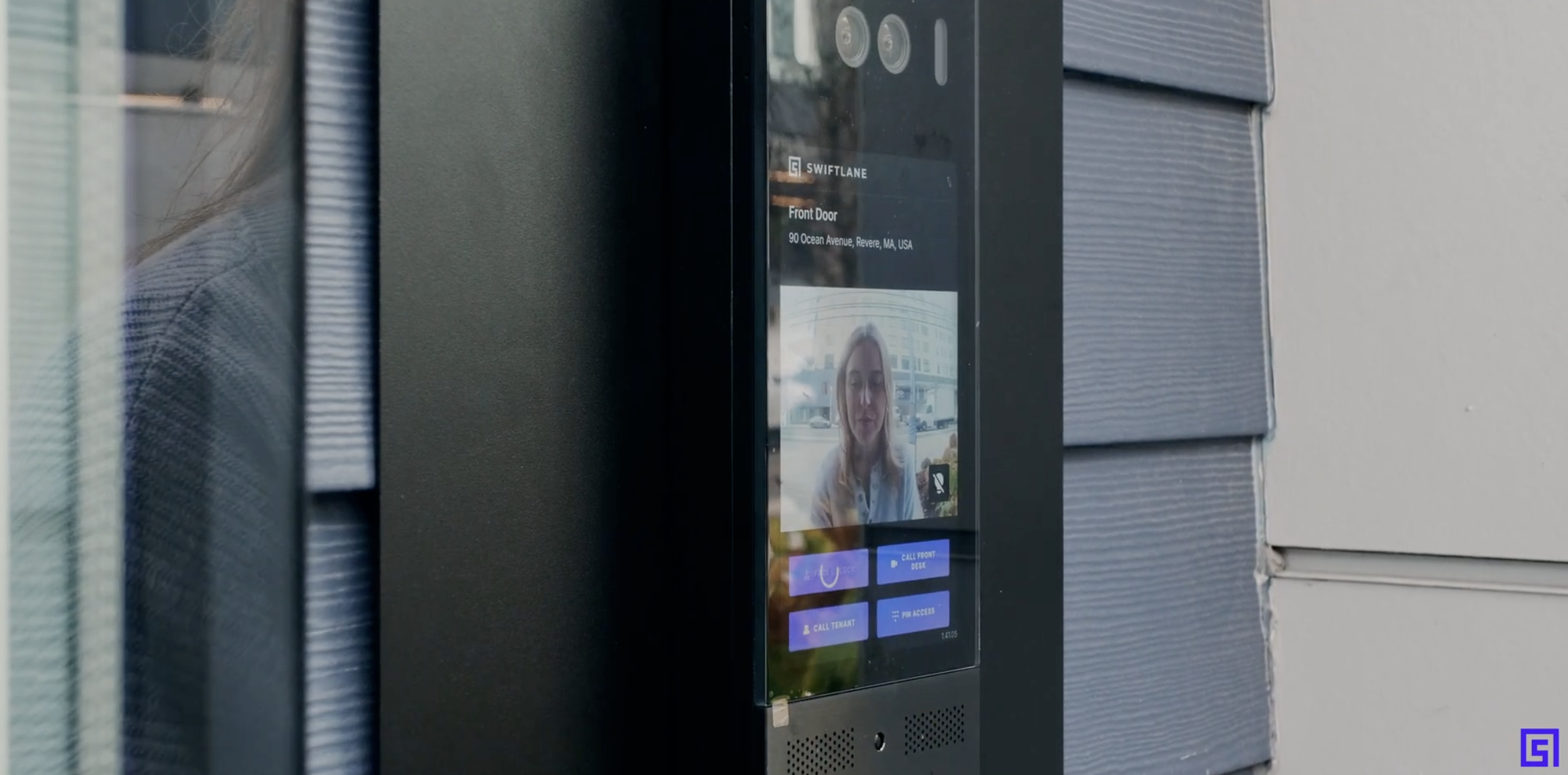
The SwiftReader X is a cutting-edge video intercom solution for multi-user buildings. Deployed in more than 10,000 buildings, the intercom solution is preferred for its high integration capacities with other smart home systems and a well-rounded feature bundle to support all users and use cases. Key highlights include:
- Touchscreen-based multi-tenant video intercom system
- Two-way video calling for visual verification
- Mobile app-based access for residents
- Remote door unlock features through the app
- Facial recognition technology to support touchless biometric access control
- Highest-in-the-market IK10 rating for vandal and impact resistance
- IP65 rating for protection against extreme weather and water
- All access footage is stored and accessible via mobile/ cloud platforms
- Support for gate access, elevators, key fobs, parking gates, package room, etc
Cost – Swiftlane’s pricing varies based on building size and specific requirements. While exact figures aren’t publicly listed, the company emphasizes cost savings by eliminating traditional expenses like telephone lines and key management.
Suitability – Built for multi-tenant/ multi-user spaces, you can implement Swiftlane solutions in all residential, commercial, or industrial spaces.
Pros – Touchless entry, advanced access methods, mobile unlock, two-way video communication, scalability, cloud-based platform.
Cons – Relatively newer brand
Customer Reviews
Compared to its competition, Swiftlane has emerged as the better choice owing to its resilience against vandalism, real-time monitoring of access events, and smooth self-onboarding of tenants. Redditors praised quick customer support and ease of usage by residents after switching from legacy systems. Most users of Swiftlane access control own or manage a multi-unit portfolio with diverse user needs.
DoorKing Access Control
Doorking Systems (DKS) is a longstanding provider of access control solutions, offering products like telephone-based entry systems, card readers, and vehicular gate operators. Established in 1948, the brand is known for its reliable entry systems, most of which make use of telephone lines and provide audio-only communication. Apart from intercom solutions, Doorking also offers card readers, keypads, locks, and gate and vehicle management systems.
Cost – For basic entry systems offered by DKS, the cost is around $500 and continues to increase with added capabilities like video monitoring. Note that this cost does not include overhead expenses, such as monthly maintenance and subscriptions.
Suitability – Single-family homes, multi-tenant apartment buildings, commercial buildings, offices
Pros – Perceived reliability due to longstanding operation, huge variety, scalability
Cons – Outdated technology, heavy replacement of telephone lines, limited video capabilities, and advanced features like facial recognition, challenging to integrate with modern security systems
Customer Reviews
DKS customers praised the systems for their straightforward functionality and robust wired connectivity to landline systems. However, some users note that the technology feels dated compared to newer, more modern systems, and the lack of advanced features, such as mobile access, can be a drawback for tech-savvy users. Additionally, due to a lack of a touchscreen directory, users have to sift through the directory manually, alphabet-by-alphabet, till they reach the tenant they want to call, adding to a poor user experience.
Checklist for 2025: Choosing the Best Apartment Security System
Having explored a range of apartment security system products in the previous sections, your next question might be, “What exactly do I need to look for in an apartment security system?”. We’ve consolidated a pre-purchase checklist for you to make sure your selected solution checks all the boxes.
Easy To Install
Most management teams prefer non-invasive methods that do not require extensive wiring, structural changes or damages to the property. This is why peel-and-stick sensors and wireless security cameras are go-to choices. However, if you’re a homeowner implementing a solitary solution, it’s best to check your lease agreements first—some landlords are flexible while others have strict no-modification policies.
Cost-Effective Investment
Budget is often the most critical factor that may tip your decision to make a purchase. You might be more receptive to offers which start at a lower cost. Additionally, be wary of associated long-term contracts such as monthly subscriptions or frequency of maintenance. If you’re planning for the long term, it’s best to invest heavily in advanced systems that will serve users for a longer period of time without overhead charges.
Reliability and Response Time
Every device you choose must act immediately and reliably in case of emergency. Go for a security system with fast response times that can minimize damage. Make sure that the system complies with industry standards and local regulations.
Monitoring Options
You’ll need to decide between self-monitoring (you get alerts and handle responses yourself) or professional monitoring (a service calls emergency stations for you). Professional monitoring typically costs $15-$ 50 monthly but can be worth it for the peace of mind, especially if you travel frequently. In contrast, self-monitoring is more suitable for smaller spaces and those who can attend to issues at any time.
Integration and Scalability
As experts in security systems, we firmly believe that Integration matters more than individual features. A few integrated components that work together seamlessly are far more effective than multiple isolated devices. Choose systems that can communicate with each other and grow with your needs. The best apartment security systems work in tandem—cameras integrate with alarms, which connect to a unified smart home system, and everything is controlled through a single mobile app.
Connectivity and Power
Wi-Fi-based systems are typically your best bet in apartments. Look for devices with strong wireless signals that can handle the interference common in multi-unit buildings. Battery-powered components are often preferable to avoid running cables, but make sure battery life is reasonable (6+ months minimum).
Mobile App Capabilities
A well-designed mobile app is crucial for remotely managing your security system and serves as a vital link to your monitoring center. Mobile apps play a crucial role in simplifying the management of security systems, allowing you to arm or disarm the system, check device status, and receive alerts directly on your mobile device. Users value apps that offer quick setup and easy navigation, enhancing the overall UX.
The Bottom Line
The perfect apartment security system balances your specific needs, constraints, and budget. Consider your building’s existing security, your daily routine, and what you’re most concerned about protecting.
Whether you’re starting from scratch or upgrading existing security, 2025 offers more apartment-friendly options than ever before. Your safety is worth the investment, and with the right approach, you can create a security system that will remain optimal for years to come.
Frequently Asked Questions
How do I choose a good security camera?
Understand your requirements. If you need an outdoor camera, select one with weather resistance, night vision capabilities, and generally clear vision for a robust solution with detailed footage. For indoor cameras, you can choose to forego high quality in exchange for high-quality vision, wider camera angles, and motion detection. For both types, also look at what kind of connectivity you prefer (wired, wireless) and the storage options (local is best for stringent security, long-term requirements, and complete control, while cloud is best for remote operation, collaboration, and short-term requirements).
Can renters install security systems in their apartments?
Absolutely, renters can install security systems specifically for their apartments, but it’s best to get your landlord’s approval first to steer clear of any property modification concerns. Typically, property owners/ managers are concerned about stick-ons/ adhesives or drilling, which may damage walls.
How much do security systems cost?
Security system costs vary widely depending on the type of system, features, and whether you’re opting for DIY or professional installation. The cheapest alarm systems start around $120 – $150. Cameras have a lesser starting price if you’re looking at solitary indoor cameras, starting around $30 – $50. Bigger alarm kits and bundles can go as high as $1200. For access control systems, which are the heart of any security system, prices vary widely depending on the capabilities the system can offer. The more advanced the technology, the higher the cost. An approximate range would be anywhere from $500 to $4000 and more, and this excludes overhead costs like installation, maintenance, and month-on-month subscriptions.
Are home security systems worth it?
Yes — apartment and home security systems are absolutely worth it when you consider the safety, peace of mind, and potential deterrence they provide. Modern systems provide remote monitoring, motion alerts, and video recording, all essential to prevent theft and unauthorized access. Systems like Swiftlane go beyond basic protection, enabling remote access, facial recognition, and smart integrations — perfect for multi-tenant buildings. Whether you’re managing a multi-unit building or securing a studio apartment, today’s flexible and scalable systems make home security well worth the investment.
What are the pros and cons of a security system?
Pros:
- Peace of mind: Real-time alerts and remote monitoring.
- Crime deterrence: Visible cameras and signage reduce the likelihood of break-ins.
- Flexible access: Touchless entry, video verification, and mobile unlocking.
- Customizable: DIY or professional setups to fit various budgets and tech comfort levels.
- Integration: Many systems (Ring, Swiftlane, UniFi) work with smart home ecosystems.
Cons:
- Upfront costs: Quality systems can be pricey, especially when bundling alarms, cameras, and access control.
- Ongoing fees: Subscriptions for cloud storage or professional monitoring add up.
- Technical limitations: Some systems (e.g., Ring) require strong Wi-Fi and only support specific platforms (e.g., Alexa).
- Customer service: Users noted inconsistent support across brands like Eufy and SimpliSafe.
Need More Info?
Still have questions about the best security system for your facility? Contact a Swiftlane expert to navigate your options and the best solution.

